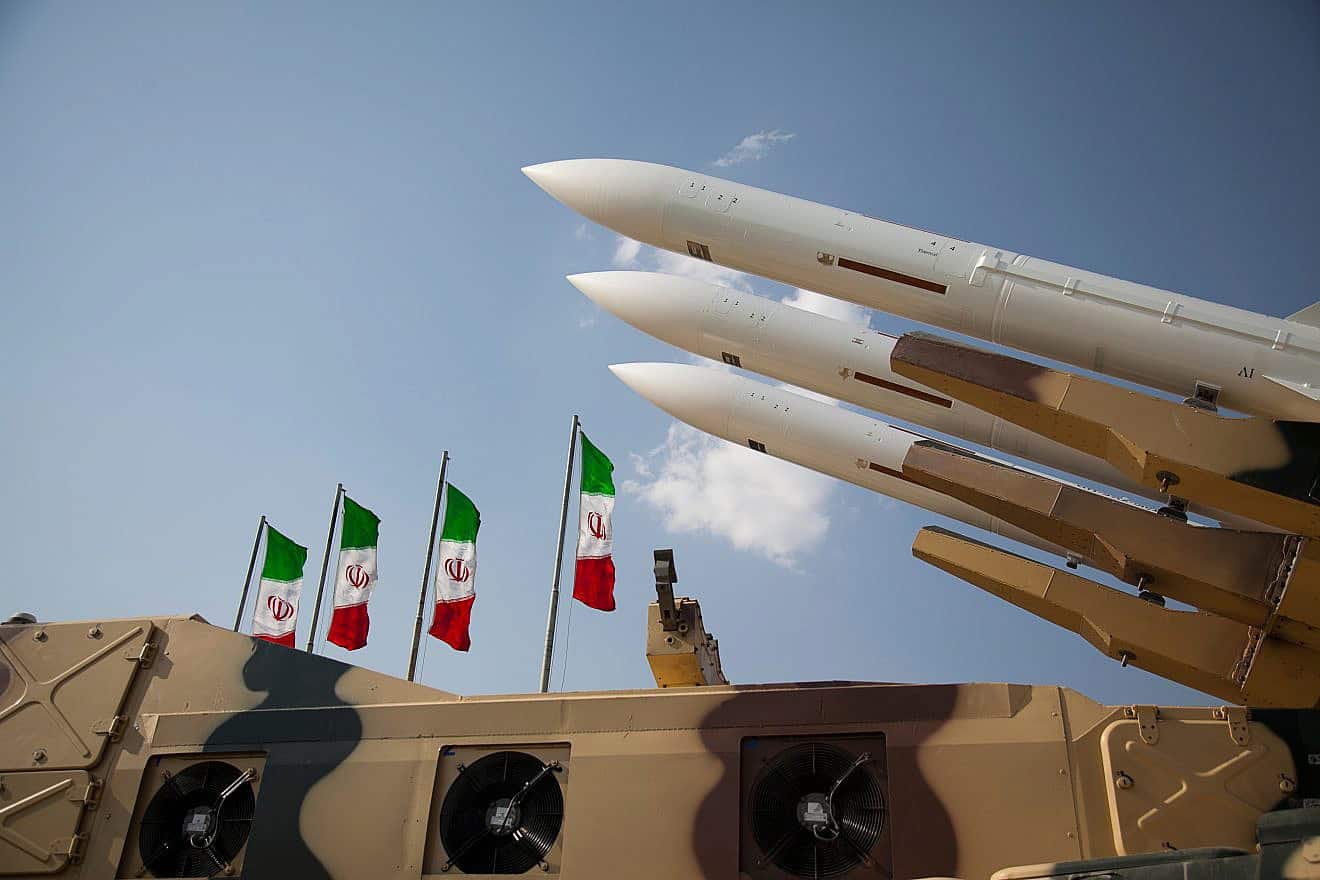After almost two weeks of waiting, Tehran retaliated against Israel for the April 1 bombing of its consulate in Damascus, Syria, launching multiple waves of drones and cruise missiles at Israel.
More than 300 weapons were reportedly fired from Lebanon, Iraq, Yemen and Iran itself, marking the first time the Islamic Republic has directly struck Israeli territory.
Shortly after the attack began, the Iranian government said it was over, but the world is waiting to see how Israel and the United States will respond.
This is what a 99% interception rate looks like. Operational footage from the Aerial Defense System protecting the Israeli airspace: pic.twitter.com/eAwcUPUDw2
— Israel Defense Forces (@IDF) April 14, 2024
The current crisis
For more than six months, Iran had tried to avoid direct involvement in the Israel-Hamas war in Gaza. It has voiced support for Hamas, while Hezbollah, Tehran’s main ally in the region, has engaged in limited battles with Israel along the southern border of Lebanon.
The bombing of the Iranian consulate in Damascus, which killed several high-ranking members of the Iranian Revolutionary Guard (IRGC) — including Brigadier Gen. Mohammad Reza Zahedi — marked a significant escalation in the violence.
The bombing was characterized as a direct attack on Iranian territory by Ayatollah Ali Khamenei, the Supreme Leader of the Islamic Republic, who promised serious retribution.
Since then, Israel, the United States and other western countries have been on high alert, preparing their armed forces for an attack, and in some cases evacuating personnel from the region.
Tehran’s track record
Prior to the April 13 attack, most observers believed Tehran’s response would be limited, perhaps even just symbolic. They argued Iran probably wouldn’t attack directly, but delegate the task to one of its regional allies such as Hezbollah in Lebanon, the Houthis in Yemen or the Popular Mobilization Forces in Iraq.
This thinking was based on Iran’s past behaviour. Tehran has told both Hamas and Washington it’s not interested in a regional war. The last time Israel assassinated an IRGC officer, the response was limited to a missile attack in Iraq, which killed a Kurdish businessman with alleged ties to Israel’s Mossad.
A more limited strike also seemed to make sense in terms of the balance of power. The Islamic Republic has a formidable military, with massive stockpiles of drones and missiles capable of striking targets throughout Israel. The arsenal is even more impressive when the capabilities of Hezbollah and Iran’s other allies are added to the equation.
However, the Islamic Republic is also vulnerable, particularly to American or Israeli airstrikes.
The Iranian Air Force is badly in need of modernization and its surface-to-air missile defences are suspect. Perhaps more importantly, the regime is still facing significant domestic opposition following the Mahsa Amini hijab protests. Its involvement in the Arab-Israeli conflict is being questioned by large segments of the public.
Instead of a rally-around-the-flag effect, a painful war on behalf of Hamas could spur more domestic unrest.
Iranian escalation
Why then, did Iran break with precedent and expose itself to such a risk?
The answer is twofold.
First, Tehran needs to be concerned about its reputation. The regime’s last response to the killing of a senior IRGC official clearly did nothing to deter Israel from killing another. Showing weakness in the face of enemy aggression undermines Iran’s position as the leader of the “Axis of Resistance,” a group of state and non-state entities centred in Iran that oppose Israel and the American presence in the region.
This is not simply a question of swagger. Tehran depends on this network for its defence, which aims to spread chaos across the region to deter an American or Israeli attack. The weapons and training it provides its allies is at the heart of this alliance, but if Tehran is afraid to confront the Israelis, how can it ask its allies to?
The second reason for Iran’s action is domestic. While supporting Palestinians may not be popular among all citizens, it’s important to the regime’s base. The ideology that justifies the Islamic Republic’s commitment to the Palestinian cause is the glue that keeps the current regime together.
There is a lot of elasticity in Iran’s ideology, which has allowed Tehran to be pragmatic in the face of external challenges in the past.
But at a certain point, Tehran has to live up to its professed virtues. If it doesn’t, it risks losing what support it has left among the public and fuelling internal fighting among the elite. Khamenei, who is 84 years old and already trying to manage the delicate succession process, cannot afford either.
@khamenei_ir owes his longevity to the #IRGC whose position has steadily expanded during his nearly 35 years in power. Had #Iran not retaliated for the April 1 killings, Khamenei's own position and plans for his succession could have been undermined. https://t.co/VBCs29DcV0
— Barbara Slavin (@barbaraslavin1) April 14, 2024
Having it both ways
Tehran still seems to be trying to avoid escalation and a larger regional war.
The tweet sent out by Iran following the attack seemed designed to apply the brakes on the crisis, claiming “the matter can be deemed concluded.”
Even prior to the attack, there were rumours that Iranian Foreign Minister Hossein Amir-Abdollahian was planning to travel to America through Iran’s diplomatic mission to the United Nations to help manage the crisis.
It’s unclear, however, how Tehran can maintain its ideological credentials at home and abroad and still keep from getting dragged into the Gaza war. Some of the Iranian barrage evaded Israeli defences, though caused little damage or loss of life.
From U.S. President Joe Biden’s perspective, this has provided an off-ramp. Despite pledging “iron-clad” support for Israel against Iran, the Biden administration reportedly talked Israel out of striking back immediately and has stated the U.S. does not want a regional war.
Benjamin Netanyahu’s Israeli government, however, likely sees things differently. No matter the damage or lack thereof, Israel will want to retaliate. There is also widespread speculation that Israel has already decided to launch an invasion of southern Lebanon this summer, imposing by force UN Resolution 1701 that calls for Hezbollah to pull back 20 miles from the Lebanese/Israeli border.
Lebanese powderkeg
Even if that doesn’t happen, the situation on the border is heating up dangerously.
More than 300 Lebanese civilians have been killed in the area and approximately 90,000 displaced. Five Israeli civilians have died killed and more than 100,000 have been displaced.
The intensity of the violence has been increasing in the area since January, and seems to be building its own momentum, separate from the fighting in Gaza.
If so, it will likely draw Israel, Hezbollah and ultimately Iran back into another escalatory spiral.



 Nasdaq Proposes Fast-Track Rule to Accelerate Index Inclusion for Major New Listings
Nasdaq Proposes Fast-Track Rule to Accelerate Index Inclusion for Major New Listings  FxWirePro- Major Crypto levels and bias summary
FxWirePro- Major Crypto levels and bias summary  JPMorgan Lifts Gold Price Forecast to $6,300 by End-2026 on Strong Central Bank and Investor Demand
JPMorgan Lifts Gold Price Forecast to $6,300 by End-2026 on Strong Central Bank and Investor Demand  Elon Musk’s Empire: SpaceX, Tesla, and xAI Merger Talks Spark Investor Debate
Elon Musk’s Empire: SpaceX, Tesla, and xAI Merger Talks Spark Investor Debate 































